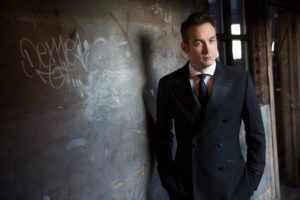
San Diego Opera 2019 Review: One Amazing Night
Stephen Costello and Stephen Powell out sing each other.
By Maria NockinOn May 15, 2019, at the 1300-seat Balboa Theatre, San Diego Opera presented tenor Stephen Costello and baritone Stephen Powell in an evening of arias and duets accompanied by the full San Diego Symphony Orchestra conducted by Bruce Stasyna. Although titles are not possible in this house, the program contained all the words sung in both the original language and English.
The First Half
When the orchestra opened with a rousing version of the overture to Johann Strauss’s operetta “Die Fledermaus,” we knew we could expect a most enjoyable evening as Stasyna drew harmonically colorful and rhythmically idiomatic playing from his orchestra. Then they launched into Ruggiero Leoncavallo’s “Pagliacci” and Stephen Powell emerged onto the stage, already crowded with more than 70 music makers, to sing the prologue. On entering the theater, I expected great singing from the tenor and a baritone who was there to sing duets with him. I was totally wrong. Stephen Powell simply rocked the room from the moment he sang “Io son il Prologo” (I am the Prologue). His voice fit the acoustics of the theater perfectly and resounded with a bronzed, muscular account of Tonio’s opening aria.
At its end, I felt a little sorry for Stephen Costello who had to follow it and possibly compete for applause at the end of his aria, “Ah! Leve-toi, soleil” (“Ah! Rise, sun”) from Gounod’s “Romeo and Juliet.” No problem. Although he seemed nervous and moved his hands throughout his aria, Costello, too, bowled the audience over. At the end of his aria, they greeted his singing with both applause and bravos.
Powell returned with Verdi’s dramatic “Eri tu qui macchiavi quell’anima” (“It was you who dirtied that soul”) from “Un Ballo in Maschera.” He sang the dramatic beginning of the aria with a firm, glinting sound that softened and became a smooth, romantic legato as his character remembered the sweetness and purity of the young, innocent Amelia who had since learned the ways of the world. Costello replied with Pinkerton’s remorseful aria from Puccini’s “Madama Butterfly.” The tiny “Addio fiorito asil” (“Farewell flower-laden refuge”) fit his warm, color-filled voice to perfection, but it is unmercifully short.
Balancing the “Pagliacci” opening, the orchestra played the melodic Intermezzo from Mascagni’s verismo opera, “Cavalleria Rusticana.” Costello and Powell brought the program to intermission with the drama-driven Act two, scene 1 duet “E lui…Desso” (“It is he”) from Verdi’s “Don Carlo.”
The Second Half
The Balboa has a very tiny lobby and much of this sold-out crowd sauntered out into the night for a few moments of starlight and cool spring air. We returned to a rendition of Beethoven’s “Fidelio” overture and Powell’s smooth and lyrical rendition of the appropriately-timed “Hymn to the Evening Star” from Wagner’s “Tannhäuser.”
Keeping his repertoire to what he does best, Costello returned singing “Che gelida manina” (“Your little hand is frozen”) from Puccini’s “La Bohème” to an imaginary Mimì, or perhaps to all the women in the audience who wished they were his Mimì. His high notes were secure with polished coloring and perfectly focused tonality.
The final instrumental piece was Massenet’s incredibly touching “Meditation” from his opera “Thais,” with the solo played by Concertmaster Jeff Thayer. It was the perfect expression of admiration between an orchestra and its audience. Costello and Powell then returned to blend their voices perfectly in the famous duet from Bizet’s “The Pearl Fishers, ”Au fond du temple saint” (“Below the holy temple”).
The final part of the program was dedicated to lighter fare. Powell sang “How to handle a Woman” from Frederic Loewe’s “Camelot” with excellent diction and considerable flair. After that, both tenor and baritone sang Italian songs. Costello sang Ernesto de Curtis’s “Non ti scordar di me” (“Don’t forget me”) and Powell “Core n’grato,” (“Ungrateful heart”), which also asks the girl to remember him. I think it will be a while before anyone in last night’s audience forgets this concert. It ended with both singers joining in a rousing rendition of Augustin Lara’s “Granada,” which included every instrument in that large orchestra from tuba to harp to castanets.
The audience did not want to go home but to my surprise, there was not even one encore. It was a weekday night, however, and concert goers who had to go to work in the morning were home by 10 p.m. San Diego Opera plans another of these recital programs and I think they are proving to be popular.
The 2019-2020 season will include a theatrical concert “Aida”, and an evening with soprano Ailyn Perez and tenor Joshua Guererro. There will also be fully staged performances of Humperdinck’s “Hansel and Gretel,” and Rossini’s “The Barber of Seville,” as well as two West Coast premieres Paola Prestini’s “Aging Magician,’’ and Zach Redler’s “The Falling and the Rising.”


